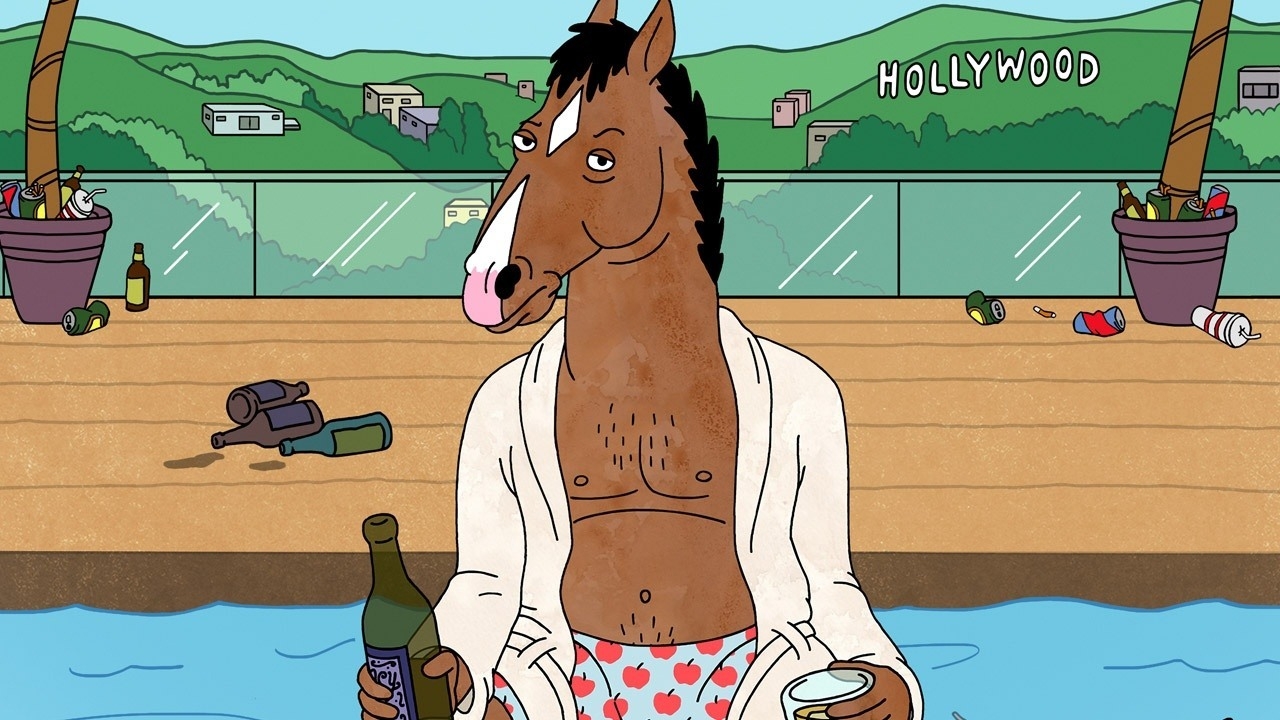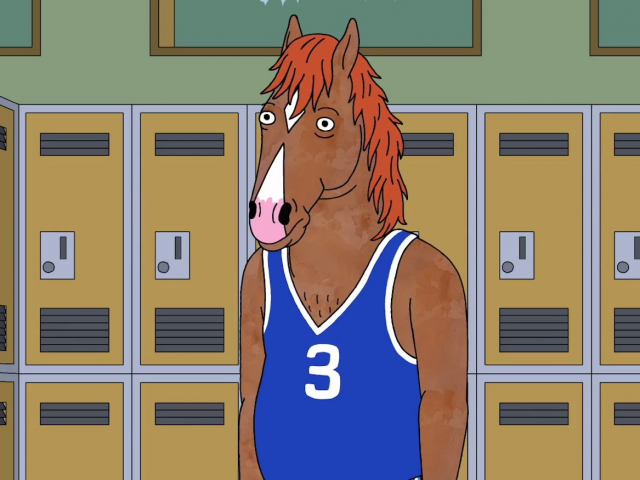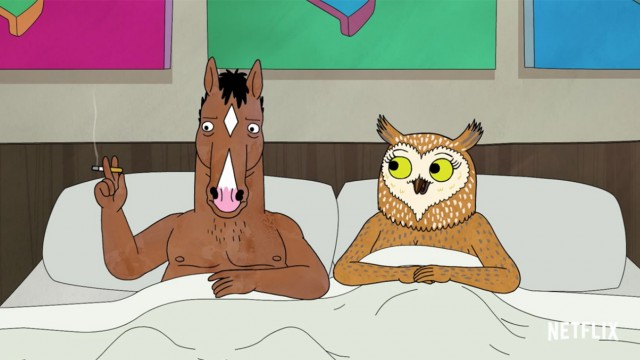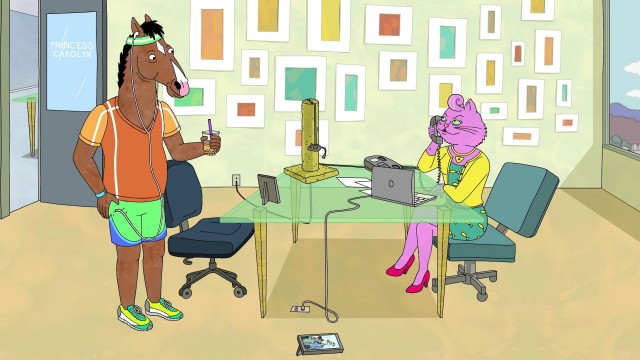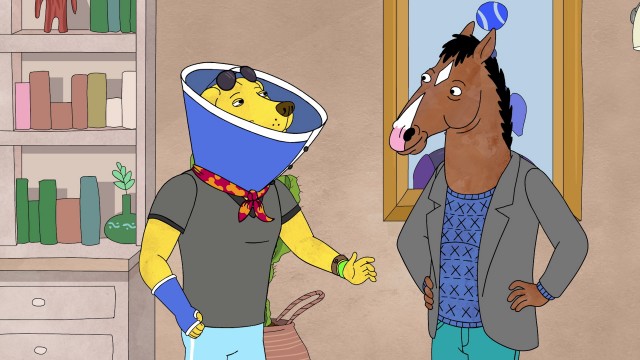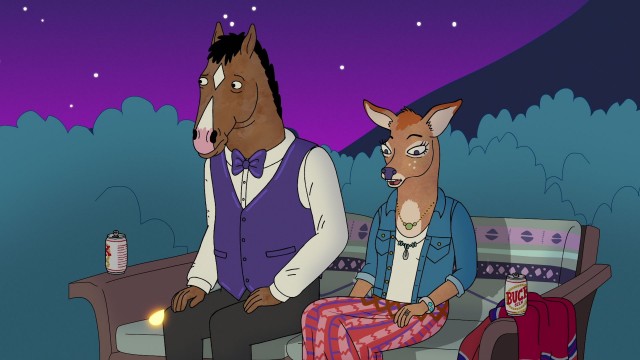NOTE: This review may contain mild spoilers for the second season of BoJack Horseman. That said, the review is written to accommodate those who have not yet seen the season, and as such, will avoid discussion of major plot developments.
Boy, what a difference a season can make!
BoJack Horseman failed to strike a chord with most critics after the debut of its first season last year, including me, with the weak comedy and confused writing often being criticized at length, despite the promising concept for a new Netflix Original animated series. Despite the show also netting some negative feedback from various viewers as well, it did build a strong cult following pretty quickly, and that was enough to get it a renewal for Season Two. I considerably criticized Season One myself, ultimately awarding it a lukewarm 60% score overall, but I was nonetheless pleased at the renewal, since I saw the potential all over BoJack Horseman, and felt that it would benefit highly from even a few nuggets of audience feedback, which Netflix shows don’t have the luxury of relying on in their lump debut seasons, unlike syndicated network television.
That shaky first season seems like such a distant memory now though, since Season Two has just premiered on Netflix, and it’s an enormous improvement all around! As I suspected, BoJack Horseman has benefited immensely from audience feedback, with the showrunners wisely taking to heart some of the complaints around the first half of Season One especially, and the result is a show that has now found its groove, being far funnier, far more clever, and doing a far better job at balancing comedy and drama. Needless to say, the difference in writing quality between Season One and Season Two is night and day as well, with Season Two having vastly superior episode scripts and jokes overall.
One of the best tweaks to Season Two, to start, is the fact that the show has lightened up a bit. It’s well and good for BoJack Horseman to build a series off of examining an empty celebrity protagonist who is depressed and unfulfilled, but when the show bills itself as a zany animated comedy for adults, along the lines of Family Guy and Bob’s Burgers, it can’t be too depressing. Season One sometimes had a problem with getting too dark and serious, to the point where it overrided the comedy, and that’s not good. Ultimately, people are watching BoJack Horseman for the comedy first and foremost, and I would think that would be more true than ever for people who actually do suffer from depression, and would want a show that lifts their spirits about their condition. Fortunately, Season Two stops being so mopey, and more consistently has fun with its ideas, which results in a show that remains earnest and sometimes even heartbreaking, but not to the point where it stops being enjoyable to watch, and that’s awesome!
Another welcome tweak in Season Two is that BoJack himself is far more likable. I get that BoJack is supposed to be depressed and self-destructive, but Season One made him seem too irredeemable at times, and that made him impossible to root for, and thus impossible to invest in. Season Two fortunately makes BoJack a bit more stable and determined to better himself, particularly now that he spends the season filming his dream role in a movie inspired by famed race horse, Secretariat. He’s still often miserable and still clearly struggles with his depression and rotten upbringing, but at least now he’s not going out of his way to be a dick, especially since Season Two does a better job at creating some influential consequences to BoJack’s bad behaviour, thanks to his autobiography from Season One taking off.
As much as BoJack’s material has improved though, the supporting cast have also gotten better arcs across the board. Todd still remains mostly a gag character, comically lazy and directionless, but even he gets an interesting season arc this time for example, and the season’s climax surprisingly incorporates his and BoJack’s friendship in a clever way. It’s a big improvement over just making him a lazy pain in the ass, and nothing else.
Likewise, Mr. Peanutbutter, BoJack’s celebrity rival, is also more likable and charming now, more appropriately representing the happiness that always just seems beyond BoJack’s reach, despite Mr. Peanutbutter walking the same life path as BoJack. Mr. Peanutbutter gets a new gig in Season Two as well, which, without spoilers, is a hysterical satire of improvising after a one-hit wonder from many years ago, and even when Mr. Peanutbutter hits his supposed low points, he has a genuinely likable attitude now. It no longer seems like Mr. Peanutbutter’s success is annoyingly unfair, and that’s the whole tedious joke. It’s easier to see now that happiness just comes easier for him, and that makes his rivalry with BoJack deeper and more interesting. BoJack even has a surprisingly big moment this season, where he admits that he’s jealous of Mr. Peanutbutter at one point, and that’s why he’s so nasty to him, because Mr. Peanutbutter represents the imagined peace that BoJack feels life has cheated him out of.
Even Princess Carolyn, arguably the character best realized in Season One, gets a great new storyline in Season Two that makes her character even better. Princess Carolyn takes interesting professional steps this season, and as much as there’s still plenty of jokes about exasperation with BoJack, there’s also a bit of a personal crisis that Princess Carolyn deals with on her own, where she starts to feel like her job at the Vigor Agency is holding her back from her potential. By the end of the season, Princess Carolyn is placed in a very promising new spot, which seems to have her character on the rise even more for a very likely Season Three.
By far the character that has improved the most however is Diane, who felt like a tedious plot device and straight woman in Season One, making her a complete waste of Alison Brie’s acting talents. Season Two frees Diane from these narrative shackles, wisely making her marriage to Mr. Peanutbutter stick without incident, and removing her as a love interest for BoJack, which is definitely the right call. This allows Diane to function as a more independent and memorable character, presenting a new dimension of Hollywood emptiness that is once again taken in a surprisingly bold and effective direction for the second half of the season. Diane is more lively and more witty than she ever was in the first season now, and that’s wonderful. The conclusion of her arc is another very satisfying one to boot, even after a shocking left turn that seems to put her in a very bad spot with Mr. Peanutbutter.
This focus on tweaking and improving the lead personalities helps Season Two of BoJack Horseman stand as more universally funny and enjoyable, with the lead personalities definitely being a lot more fun to watch now. It no longer feels like Amy Sedaris and Paul F. Tompkins are left to single-handedly inject energy into the show, with all of the actors now being given far more to do, and far more emotional range, especially Alison Brie.
Fortunately, BoJack gets a new (and superior) love interest in Season Two, Wanda, voiced by Lisa Kudrow. Wanda has been in a coma for thirty years, and despite that, is a network executive that resumes her job while dating BoJack. She makes for an amusing parody of out-of-touch network executives, but she also brings out an honesty and purity in BoJack that Diane could never do, for better or for worse. Since Wanda is untainted by modern Hollywood, she represents a better time for BoJack and the television industry, which he’s naturally attracted to. As much as we also have various new supporting characters showing up to complement some callbacks, Wanda makes for one of the best new additions to the show this season.
In fact, that’s one of the only let-downs of Season Two, the fact that some of Season One’s better supporting characters don’t show up that much. You do get a neat sort of reunion episode with BoJack and his former cast of fictional sitcom, “Horsin’ Around” in Season Two, but beyond that, and another small appearance, Kristen Schaal’s Sarah Lynn is largely absent from Season Two, likely due to Schaal being busy with commitments to FOX for The Last Man on Earth. Likewise, Patton Oswalt barely shows up as Pinky Penguin, or other similar personalities, beyond a slight cameo, which initially establishes the success of BoJack’s autobiography. It’s a nitpick, but it’s a shame that some of the actors that helped to service Season One aren’t as prevalent in Season Two.
Still, the show has finally found its proper balance of comedy and drama, which now layers many far better episodes and character arcs. Unlike Season One, Season Two doesn’t have a single dud episode, which is fantastic! All twelve of the new episodes for BoJack Horseman are very smartly written and satisfying, with most of the drama saved for later in the season. Still, even when the show gets serious, it’s nonetheless engaging and satisfying, since the emotion now feels more genuine, and the show is clearly no longer trying too hard to be edgy. This clearly benefits the comedy as well, since BoJack Horseman is leagues funnier and more clever in Season Two, but this also means that when the show does explore more dramatic territory, it’s more effective, since the emotional resonance is more impactful when it comes on the heels of so much great humour.
All in all, BoJack Horseman is finally achieving its potential in Season Two. It’s come a long way now, and is finally the uproariously clever, surprisingly heartfelt and enjoyably funny animated sitcom that it deserves to be. If you didn’t feel satisfied by Season One, I implore you to give the show another chance in Season Two. Like most other animated sitcoms, BoJack Horseman didn’t find its footing right away, but now that it has, it feels like there’s nothing else quite like it, even if there’s no shortage of rival animated sitcoms for adults outside of the realm of Netflix.
The “Hollywoo” lifestyle may be no more glamourous for BoJack and friends in their sophomore turn, but it’s definitely worth pursuing now.

